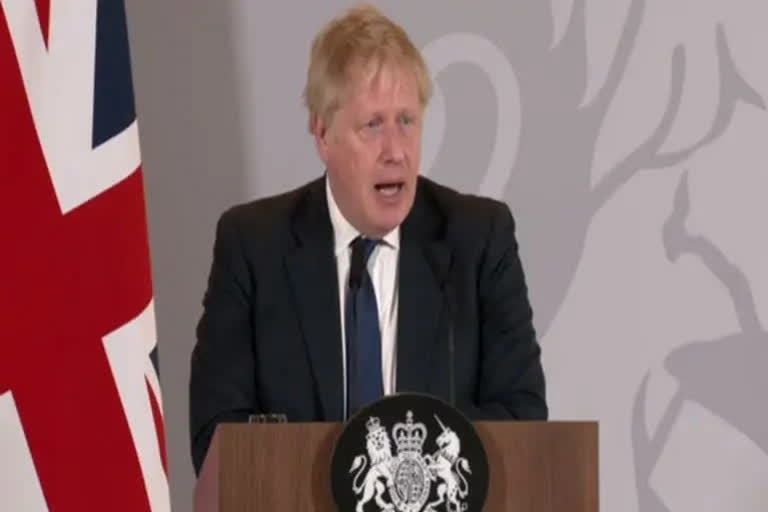New Delhi: India’s position on Ukraine, its premium on peaceful means to end the ongoing conflict, and the pursuit of its stated policy of strategic autonomy where national interest is deemed paramount, may be throwing up costs to bear. There are indications that the UK government’s position on the ‘Khalistan’ movement may be changing, and much to India’s detriment, may lead to efforts to revive the waning movement to set up a separate homeland for Sikhs. Along with Canada and Germany, the UK has been considered to be among the foreign hotspots where the presence of supporters for the movement is considered notable.
Jagtar Johal Issue
All of a sudden, after four-and-a-half years of maintaining a muted silence on the issue, British PM Boris Johnson, has recently shot off a letter to the British opposition leader Keir Starmer admitting that a British Sikh activist Jagtar Singh Johal has been "arbitrarily" detained in an Indian jail “without formal charges being pressed against him”. In India for his marriage, Johal was arrested by the Indian police in November 2017 over his alleged connections to the Khalistan Liberation Force (KLF), a banned terrorist organization that aims at the creation of a separate homeland for Sikhs after seceding from India.
Johnson admits in the letter to Starmer of having personally raised the matter with Indian PM Narendra Modi during their recent meetings. The timing is interesting in the episode as Johnson’s letter to the top Labour party leader follows a UN panel report in May where Johal’s case was highlighted and also called for his release from Indian detention.
In Tandem with the US
The UK move seems to be in tandem with similar moves in the US. On July 2, David Curry, commissioner of the US Commission on International Religious Freedom (USCIRF), tweeted: “USCIRF is concerned about the Indian government’s continued repression of critical voices—especially religious minorities and those reporting on and advocating for them.”
Another USCIRF commissioner Stephen Schneck also tweeted: “Human rights advocates, journalists, activists, and faith leaders in #India face harassment for speaking out and reporting religious freedom conditions. This is not reflective of a country with a history of democracy.”
On June 30, Rashad Hussain, the US ambassador-at-large for international religious freedom, said the US is speaking directly to India about its "concerns". USCIRF is a US federal government agency that makes policy recommendations to the President, Secretary of State, and Congress and tracks the implementation of these recommendations.
India’s Neutrality
The moves by the UK and US may be in reaction to the Indian position on the Ukraine conflict and the reluctance to be more aggressive in its belligerence to China which the US-led block sees as a growing threat. Ever since the Russian forces drove into Ukraine in a “special operation” on the dawn of February 24, India’s position has been a neutral one despite the efforts by both the US-led Western bloc and the Russia-China axis.
The Indian position has resulted in not kowtowing to the demands of the US-led block to condemn Russia in categorical terms nor to align in totality with the emerging Russia-China axis. On the contrary, business relations between India and Russia have been on the upswing after imposition of US-led sanctions on Russia.
India is also a founder member of the increasingly assertive BRICS, a platform of emerging economies that was set up in 2009. Besides India, BRICS comprises Brazil, Russia, China and South Africa, with a very strong likelihood that Iran, Saudi Arabia and Argentina may soon join even as a host of countries are believed to be waiting in the wings to join the grouping.
At the moment, BRICS represents about 43% of humanity with just India and China together representing 36% of the world population. On the other hand, the European Union (EU) represents only about 9.8% of humanity while the 30-member NATO alliance represents about 12.22% of the world's population.
DSN Visit to Pakistan
India was deliberately left out from a 'historic' NATO Summit in Madrid on June 29-30, where all 30 member countries and key NATO partners from Europe and Asia had converged. And just a day before that, on June 28, a team of 12 British Army and Royal Air Force (RAF) officials belonging to the Sikh community visited Pakistan. According to a source in the Indian security establishment, the 12-member delegation belonging to an organisation called ‘Defence Sikh Network’ (DSN) was made to interact with General Qamar Bajwa, the all-powerful chief of the Pakistan army.
DSN acts as a focal point for serving Sikhs in the British military and is officially part of the British defence ministry. Therefore, there is no way it could have embarked on a trip to Pakistan without the approval of the Johnson-led British government. At least 150 Sikhs serve in the British military. On June 6, the DSN referred to ‘Operation Blue-Star’ in its posts on social media.
The post said: “The month of June holds many painful memories for Sikhs across the world, as they remember the events of 1984, when the sanctity of many gurdwaras, not least the Harmandir Sahib & Akaal Takht was so violently compromised." "The DSN stands with the Sikh community in remembering the countless loss of life and recognise the ongoing trauma caused to many in the Sikh community and beyond since this time."
‘Operation Blue-Star’ was the codename for an Indian military operation conducted on the June 1-10, 1984 inside Amritsar’s Golden Temple, the holiest of the Sikh shrines, to flush out supporters of the separatist Khalistan movement led by Jarnail Singh Bhindranwale.




